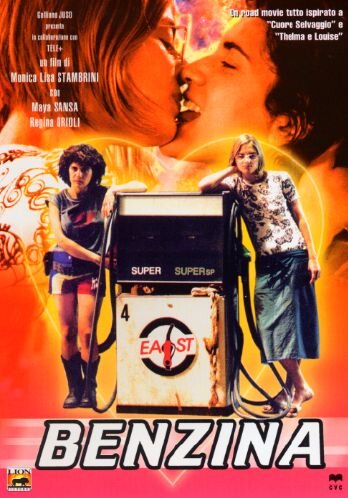
2001
Aka Gasoline
Running time: 87 mins
Italy
Based on the novel by Elena Stancanelli
Produced by Galliano Iuso for Digital Film, with input from the Dipartimentp dello spettacolo
Distribution: Lion Lantia (2002)
Release date: 31-05-2002
Director: Monica Stambrini
Screenplay: Monica Stambrini, Anne Riitta Ciccone
Photography: Fabio Cianchetti
Music: Massimo Zamboni
Editor: Paola Freddi
Art director: Alessandro Rosa
Costumes: Antonella Cannarozzi
Special effects: Franco Galiano
Cast: Maya Sansa (Stella), Regina Orioli (Lenni), Pietro Ragusa (Filippo), Chiara Conti (Pippi), Marco Quaglia (Sandro), Mariella Valentini (Lenni’s mother), Luigi Maria Burruano (the priest), Osvaldo Livio Alzari (cashier)
Benzina is a 2001 thriller that was marketed as an Italian equivalent to Thelma and Louise (91) and which managed to get a small amount of International distribution (it was shown at festivals in the States and UK). It’s a small scale production made with obviously limited means and although it’s obviously the work of inexperienced filmmakers, it’s not at all without interest.
Nervous Lenni (Regina Orioli) and intense Stella (Maya Sansa) work respectively as the waitress and mechanic in an out of the way garage. They also happen to be in a fairly contented lesbian relationship… until Lenni’s bossy mother appears out of the blue and starts voicing her disapproval. In the ensuing argument Stella knocks her over, she cracks her head against a worktop and dies. Rather than call the police Lenni and Stella decide to clean up all evidence of the accident, during the course of which they discover an envelope stuffed full of cash in her handbag. Fearful of the consequences of their actions they decide to go on the run, but Lenni keeps hearing her mother’s voice in her head and there never seems to be a convenient moment to dispose of the corpse, which is still stuffed inconveniently in their boot.
Along the way they manage to accidentally crash into a philosophical priest, Father Gabriele (Luigi Maria Barruano), who insists that they give him a lift to the nearest town. No sooner have they managed to get rid of him than they run into a trio of coked-up idiots who seem to have some kind of beef with them. When these goons realise that the girls are carrying a load of money they decide to do all they can to take it from them.
Although the filmmakers sensibly decided to keep things to a small scale, Benzina is unable to escape its obviously low budget. It’s too dialogue heavy to be effective as a thriller – the opening twenty minutes in particular feel very much like a filmed version of a theatrical play – and the tension is further dissipated by lengthy flashbacks showing how Lenni and Stella’s relationship developed. In an attempt to make it visually interesting the director throws in all kinds of cinematographic gimmicks – hand held camerawork, found footage shot by the characters, variable filming speeds – but these are too familiar to make much of an impression. In fact they only distract from Fabio Cianchetti’s otherwise impressive cinematography, and it’s not hard to see why he’s been one of the busier Italian directors of photography over the last twenty five years (his other work includes Bertolucci’s The Dreamers, Cristina Comencini’s Don’t Tell and Saverio Costanzo’s The Solitude of Prime Numbers).
First time director Monica Stambrini does a fair job, but she doesn’t display a knack for filming action sequences and allows the pacing to meander. A couple of sequences – most particularly a dangerous confrontation in a nightclub toilet – really don’t work at all, which is a shame because the quieter sections of the film are rather effective. There’s also an interesting sweaty, small town ambiance that recalls some of the earlier work of the Coen brothers, most particularly Blood Simple, which must have been an influence. Stambrini had previously made some well regarded shorts, and although her work shows promise she is still to make another film.
As for the performances, they’re variable. The protagonists are fine: Italo-Persian actress Maya Sansa has since appeared in much respected films like The Best of Youth (2003) and Good Morning Night (2003), whereas Regina Orioli’s career never took off in quite the same way. Sex symbol Chiara Conti, who also popped up in Argento’s Do You Like Hitchcock (2005) and Alex Infascelli’s Hate 2.0 (2006), has a small role.
